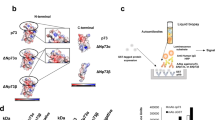Abstract
Mutation of the p53 gene is a common event in colorectal cancer. This alteration can result in cellular accumulation of p53 and may also induce p53 antibodies. Accumulation of p53 in tumour cells has been associated with poor prognosis of colorectal cancer. We tested preoperative sera from 255 patients with colorectal cancer by enzyme-linked immunosorbent assay (ELISA). A total of 70.2% had reactivity that was higher than the 'low' control serum. Employing a cut-off level of 10% of the 'high' control sample, 25.5% of the patients were positive for p53 antibodies. The presence of p53 antibodies correlated with the following prognostic factors: histological differentiation grade, shape of the tumour, and tumour invasion into blood vessels. Patients with p53 antibodies were shown to have decreased survival and decreased disease-free survival. Specifically for patients with cancer stage A and B1 the presence of p53 antibodies selected a subgroup with poor prognosis.
This is a preview of subscription content, access via your institution
Access options
Subscribe to this journal
Receive 24 print issues and online access
$259.00 per year
only $10.79 per issue
Buy this article
- Purchase on Springer Link
- Instant access to full article PDF
Prices may be subject to local taxes which are calculated during checkout
Similar content being viewed by others

Author information
Authors and Affiliations
Rights and permissions
About this article
Cite this article
Houbiers, J., van der Burg, S., van de Watering, L. et al. Antibodies against p53 are associated with poor prognosis of colorectal cancer. Br J Cancer 72, 637–641 (1995). https://doi.org/10.1038/bjc.1995.386
Issue Date:
DOI: https://doi.org/10.1038/bjc.1995.386
This article is cited by
-
Serum p53 antibody as a potential tumor marker in extrahepatic cholangiocarcinoma
Surgery Today (2017)
-
Usefulness of serum p53 antibody measurement in colorectal cancer: an examination of 1384 primary colorectal cancer patients
Surgery Today (2014)
-
Early detection of cancer in the general population: a blinded case–control study of p53 autoantibodies in colorectal cancer
British Journal of Cancer (2013)
-
B lymphocyte inhibition of anti-tumor response depends on expansion of Treg but is independent of B-cell IL-10 secretion
Cancer Immunology, Immunotherapy (2013)
-
Secreted recombinant P53 protein from Pichia pastoris is a useful antigen for detection of serum p53: autoantibody in patients with advanced colorectal adenocarcinoma
Molecular Biology Reports (2013)


